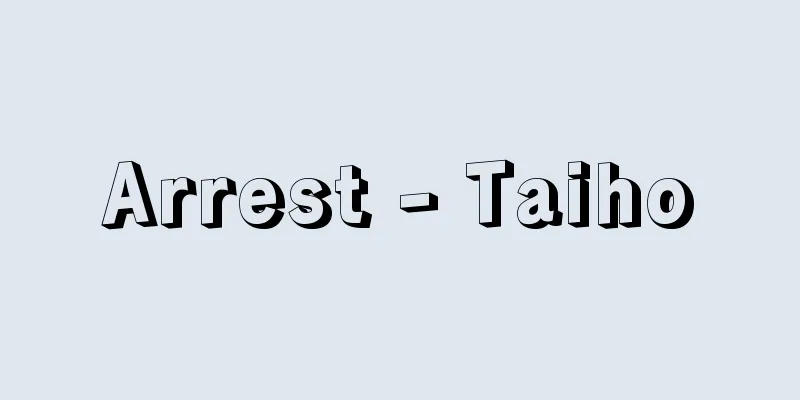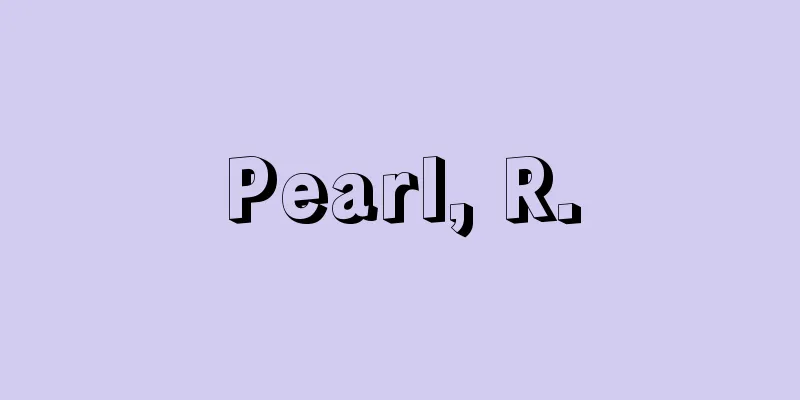Arrest - Taiho

|
It refers to a measure to detain a suspect. The Constitution stipulates that no person shall be arrested except by warrant issued by a competent judicial official (judge) and clearly indicating the crime for which the arrest is made, except in cases where a person is arrested in the act of committing a crime (Article 33 of the Constitution. Warrant principle). Therefore, under the Constitution, there are arrests by warrant (ordinary arrests) and arrests in the act of committing a crime, but the Code of Criminal Procedure also allows for emergency arrests. [Ichiro Uchida and Morikazu Taguchi] Regular arrestWhen there is sufficient reason to suspect that a suspect has committed a crime, an arrest is carried out by a public prosecutor, a public prosecutor's assistant officer, or a judicial police officer with an arrest warrant issued by a judge (Criminal Procedure Law, Article 199, Paragraph 1). However, in light of the suspect's age, circumstances, the severity and nature of the crime, and other circumstances, if it is deemed that there is clearly no need for arrest, such as there being no risk of the suspect fleeing or destroying evidence, an arrest warrant will not be issued (Criminal Procedure Rules, Article 142-3). In addition, for certain minor crimes, arrests are only possible if the suspect has no fixed address or does not respond to a request from the investigative agency to appear (Criminal Procedure Law, Article 199, Paragraph 1, proviso). [Moriichi Taguchi] Arrested in the actA person who is currently committing or has just finished committing a crime is called a "criminal in flagrante delicto" (Article 212, Paragraph 1 of the same law), and anyone may arrest such a person without an arrest warrant (Article 213 of the same law). An arrest in flagrante delicto is an exception to the warrant system, since suspicion is clear. When a person other than a public prosecutor, a public prosecutor's assistant officer, or a judicial police officer arrests a person in flagrante delicto, he or she must immediately hand the person over to a public prosecutor or a judicial police officer of the district or ward public prosecutor's office (Article 214 of the same law). When a judicial police officer receives a person in flagrante delicto, he or she must promptly bring the person in flagrante delicto to a judicial police officer. When a judicial police officer receives a criminal, he or she must ask the arrested person about his or her name, address, and the reason for the arrest. When necessary, the judicial police officer may request that the arrested person accompany him or her to a government office (Article 215 of the same law). [Ichiro Uchida and Morikazu Taguchi] Emergency ArrestWhen a public prosecutor, public prosecutor's assistant officer, or judicial police officer has sufficient reason to suspect that a suspect has committed a crime punishable by death or life imprisonment or imprisonment for a maximum term of three years or more, and when urgency is required and it is not possible to obtain an arrest warrant issued by a judge, he or she may arrest the suspect after explaining the reason (Article 210 of the same law). After an arrest, the procedure for obtaining an arrest warrant issued by a judge must be carried out immediately, and if an arrest warrant cannot be issued, the suspect must be released immediately (Article 210 of the same law). Article 33 of the Constitution stipulates that the only exception to the warrant system is an arrest in flagrante delicto, so the question arises as to whether emergency arrests violate Article 33 of the Constitution, but academic theory and precedents have interpreted it as constitutional. [Ichiro Uchida and Morikazu Taguchi] Post-arrest proceduresThere are time limits for procedures after arrest. (1) When a public prosecutor's assistant officer or a judicial constable arrests a suspect with an arrest warrant, the public prosecutor's assistant officer must immediately bring the suspect to a public prosecutor, and the judicial constable must immediately bring the suspect to a judicial police officer (Criminal Procedure Law, Article 202). (2) When a judicial police officer arrests a suspect with an arrest warrant or receives a suspect who has been arrested with an arrest warrant, he or she must immediately inform the suspect of the gist of the crime and that he or she may appoint a defense attorney, and give the suspect an opportunity to defend himself or herself. If the judicial police officer believes that there is no need for detention, he or she must immediately release the suspect, and if the judicial police officer believes that there is a need for detention, he or she must carry out procedures to send the suspect, along with documents and evidence, to a public prosecutor within 48 hours of the suspect's physical detention (Criminal Procedure Law, Article 203, Paragraphs 1 and 2). The prosecutor who receives the suspect shall give him an opportunity to make a defense, and if there is no need for detention, he shall immediately release him, and if he believes there is a need for detention, he shall request the judge to detain the suspect within 24 hours of receiving the suspect (Article 205, Paragraph 1 of the same law). This time limit cannot exceed 72 hours from the time the suspect is taken into custody (Article 205, Paragraph 2 of the same law). In other words, an arrested suspect will be detained for a maximum of three days. The procedures after arrest for emergency arrests and arrests in flagrante delicto are the same as for regular arrests. Arrests on minor separate charges, such as arresting and detaining a person on a minor separate charge for the purpose of questioning the main, serious case, and then questioning the person solely or mainly on the main case, are illegal. This is because it circumvents the warrant system. [Ichiro Uchida and Morikazu Taguchi] [Reference] | | | | | | |Source: Shogakukan Encyclopedia Nipponica About Encyclopedia Nipponica Information | Legend |
|
被疑者の身柄を拘束する処分をいう。憲法は、何人(なんぴと)も、現行犯として逮捕される場合を除いては、権限を有する司法官憲(裁判官)が発しかつ理由となっている犯罪を明示する令状によらなければ、逮捕されない、と規定している(憲法33条。令状主義)。したがって、逮捕には、憲法上は、令状による逮捕(通常逮捕)と現行犯逮捕があることになるが、刑事訴訟法はこれ以外に緊急逮捕を認めている。 [内田一郎・田口守一] 通常逮捕被疑者が罪を犯したことを疑うに足りる相当な理由がある場合に、裁判官から逮捕状を得て、検察官、検察事務官または司法警察職員により行われる(刑事訴訟法199条1項)。ただし、被疑者の年齢、境遇、犯罪の軽重および態様などの諸般の事情に照らし、被疑者に逃亡のおそれがなく、かつ、証拠を隠滅するおそれがないなど明らかに逮捕の必要がないと認められるときには、逮捕状は発付されない(刑事訴訟規則142条の3)。また、一定の軽微犯罪については、被疑者が住居不定か捜査機関の出頭要求に応じない場合に限り逮捕が可能となる(刑事訴訟法199条1項但書)。 [田口守一] 現行犯逮捕現に罪を行い、または現に罪を行い終わった者を現行犯人といい(同法212条1項)、何人でも、逮捕状なくしてこれを逮捕することができる(同法213条)。現行犯逮捕は、嫌疑が明白であることから、令状主義の例外とされる。検察官、検察事務官および司法警察職員以外の者は、現行犯人を逮捕したときは、ただちにこれを地方検察庁もしくは区検察庁の検察官または司法警察職員に引き渡さなければならない(同法214条)。司法巡査は、現行犯人を受け取ったときは、速やかにこれを司法警察員に引致しなければならない。司法巡査は、犯人を受け取った場合には、逮捕者の氏名、住居および逮捕の事由を聴き取らなければならない。必要があるときは、逮捕者に対しともに官公署に行くことを求めることができる(同法215条)。 [内田一郎・田口守一] 緊急逮捕検察官、検察事務官または司法警察職員は、死刑または無期もしくは長期3年以上の懲役もしくは禁錮にあたる罪を犯したことを疑うに足りる十分な理由がある場合で、急速を要し、裁判官の逮捕状を求めることができないときは、その理由を告げて被疑者を逮捕することができる(同法210条)。逮捕後は、ただちに裁判官の逮捕状を求める手続をしなければならず、逮捕状が発せられないときは、ただちに被疑者を釈放しなければならない(同法210条)。憲法第33条は、令状主義の例外を現行犯逮捕のみと規定したので、緊急逮捕が憲法第33条に反しないかが問題となるが、学説・判例はこれを合憲と解している。 [内田一郎・田口守一] 逮捕後の手続逮捕後の手続については、時間の制限がある。(1)検察事務官または司法巡査が逮捕状により被疑者を逮捕したときは、ただちに、検察事務官はこれを検察官に、司法巡査はこれを司法警察員に引致しなければならない(刑事訴訟法202条)。(2)司法警察員は、逮捕状により被疑者を逮捕したとき、または逮捕状により逮捕された被疑者を受け取ったときは、ただちに犯罪事実の要旨および弁護人を選任することができる旨を告げたうえ、弁解の機会を与え、留置の必要がないと思料する(考える)ときはただちにこれを釈放し、留置の必要があると思料するときは被疑者が身体を拘束された時から48時間以内に書類および証拠物とともにこれを検察官に送致する手続をしなければならない(同法203条1項・2項)。 送致を受けた検察官は、弁解の機会を付与し、留置の必要がないときは、ただちに釈放し、留置の必要があると思料するときは、被疑者を受け取ったときから24時間以内に、裁判官に被疑者の勾留(こうりゅう)を請求しなければならない(同法205条1項)。この時間の制限は、被疑者が身体を拘束されたときから72時間を超えることはできない(同法205条2項)。すなわち、逮捕された被疑者は最大で3日間の身柄拘束を受けることになる。 緊急逮捕、現行犯逮捕についても、逮捕後の手続は、通常逮捕の場合と同様である。重大な本件について取り調べる目的で、まず軽い別件で逮捕・勾留しておいてもっぱら、または主として本件について取調べをするような、いわゆる別件逮捕は違法である。令状主義を潜脱することになるからである。 [内田一郎・田口守一] [参照項目] | | | | | | |出典 小学館 日本大百科全書(ニッポニカ)日本大百科全書(ニッポニカ)について 情報 | 凡例 |
Recommend
Katsura shelf - It's a wig
…The new palace, which is connected to the south ...
Red mouth - Akaokuchi
〘Noun〙 Scarlet large-mouthed hakama (trousers) . R...
Mesembryanthemum
...A group of succulents from the family Vulaceae...
Slope - Norimen
A slope formed where soil has been removed or wher...
Laundry soap (sentaku sekken) - household soap
Soap used in general households for washing clothe...
Tapan
...The dance is generally a round dance called ko...
Mignard, Pierre
Born: 1610/1612.11. Troyes Died May 30, 1695. Pari...
Dancer - Maibito
〘 noun 〙 A person who dances Bugaku. A person who ...
QC Circle
...And foremen and others still retain a large de...
axon terminal
…When a neuron generates a spike in the body, an ...
Rosemary Oil - Rosemary
Also known as rosemarine oil. It is obtained by s...
Greek mythology
Mythology is a mythology told in extant ancient G...
Red and Black - Akatokuro (English spelling) Le Rouge et le Noir
A novel by the French novelist Stendhal. Subtitled...
Optimates (English spelling) optimates [Latin]
Originally meaning "the best people," th...
Dismantling the Movement - Sports Day
...When walking, the movements of the limbs are u...









